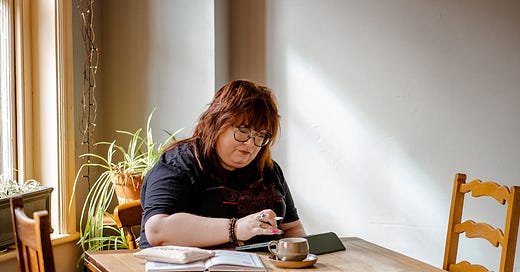As I scrolled through my TikTok feed on Saturday afternoon, I felt like I’d time traveled back to the early 2000s. There in front of me were two young women, smiling to the camera, a trending sound played in the background as the caption read:
“Oh my god, this filter makes you chubby”
At the very least it was insensitive, at its worst it’s harmful to young people who are being shown their body is a punch line. What was even worse than the video, were the comments, people asking why we’re so bothered, and questioning why people aren’t concerned by filters that make someone look thinner.
Any filter that changes how we look can be problematic, and like most things there is a spectrum of impact. A filter that makes my hair redder, or gives my room a spooky glow doesn’t do people harm. On the other hand, a filter which uses fat stereotypes and is purposefully designed to make fat folks a joke? That’s dangerous.
Of course most of these women turned off their comments, because whilst they thought it would look “funny” to post that video, they didn’t want to own their true colours and deal with the fall out of their anti-fatness.
So, why is this AI filter garnering so much negative attention and backlash?
With the rising numbers of people taking GLP-1s for weight loss, and the casual nature in which they have become socially accepted across society, it’s becoming even more acceptable to shame fat folks.
It started out as a negative comment on peoples videos, commenting on someone's body change, then we started seeing people creating accounts to document their WL drug journey. And then came the body positive influencers who played pretend for us, built their following and back balance, only to turn their backs on their communities the moment they discovered they could be thin without dieting.
Ask anyone in the fat community, and they will tell you how hard the past few years have been. I’m not even surprised that more people are using these drugs, because it’s really hard to constantly be told you’re delusional for respecting your fat body.
We watched in the 2010s as people turned their back on calorie controlled diets, and mainstream diet brands had to sing a different version of the same song in order to continue profiting off peoples insecurities. As we all learned that diets don’t work, the winds changed, the wellness industry and all its goopy nonsense became trendy.
These drugs are being marketed and positioned in such a way that we’ve returned to: “well if I can do it, then so can you!”. It leaves people under the influence of diet culture wondering why on earth anyone in a larger body wouldn’t take these drugs.
Well, as one of those larger bodied folk, I can tell you that choosing to quit dieting has done more for my confidence, self esteem and body image than any diet, pill, or goopy potion ever could.
And seeing these straight sized women — who probably spent IWD liking videos under the hashtags #girlssupportinggirls — doesn’t really hurt my feelings. But it could hurt the feelings of my kid, or all the other young people who see them.
It will hurt their own children when they realise that their body is seen as a joke, or isn’t acceptable in the eyes of their parents. These kinds of behaviours didn’t just start this week, they started when we were kids, before we were fully grown.
It’s behaviours and insecure individuals like this that led to a lifetime of body discomfort, and whilst others just got on with their lives, my dreams were stolen from me because I believed I needed to be thin in order to achieve success.
This AI filter is dangerous, and it’s incredibly disappointing to see how many people find it funny. One thing I know for sure is that we’ve all experienced some kind of body shame and have an insecurity all thanks to diet culture and unrealistic beauty standards.
Perhaps the women using this filter could consider how their time and energy could be better used to actually support ALLl women, and not just themselves.





